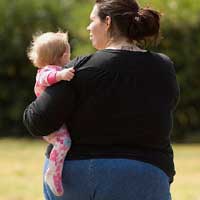Antioxidant pyrroloquinoline quinone (PQQ) may prevent the development of nonalcoholic fatty liver disease in offspring, revealed by researchers in The FASEB Journal. The research is the first to demonstrate that PQQ has this type of protective effect.
Antioxidant pyrroloquinoline quinone PQQ is a naturally occurring antioxidant found in soil and foods, such as soy, parsley, celery, kiwi, and papaya, and is also present in high quantities in human breast milk.
Nonalcoholic fatty liver disease is the most common liver disease worldwide, and affects approximately 35 percent of obese children in North America alone. Despite its growing prevalence, no effective treatment exists to date.
Antioxidant during pregnancy
These results suggest that supplementation with PQQ, particularly during pregnancy and lactation, might help slow the advancing epidemic of NAFLD in the next generation.
To make their discovery, researchers fed mouse mothers a normal diet or one with high amounts of fat, sugar, and cholesterol as is typical of human Western-style diets. The researchers then provided a subset of mice from each diet group with supplemental PQQ in their drinking water. Their offspring were kept on the same diets and PQQ into early adulthood, except for one group that had PQQ supplementation discontinued at weaning (3 weeks of age). Offspring fed the high-fat, -sugar, and -cholesterol diet gained more weight than mice fed a normal diet, and PQQ did not change the amount of weight gain. Those with PQQ supplementation, however, did have less fat in their livers, even before they were born, and PQQ prevented the accumulation of damaging fats in the liver, despite continued consumption of the experimental diet. This was associated with reduced inflammation and was found in the mothers that had only been exposed to PQQ during pregnancy and lactation.
“While this intriguing study leaves open the question of whether the effects are intrauterine or transgenerational-epigenetic in character (or both), the potential relevance to human pre- and postnatal obesity is clear,” said Thoru Pederson, Ph.D., Editor-in-Chief of The FASEB Journal. “This work sets specific issues in play for follow-up studies.”
Source: Federation of American Societies for Experimental Biology, USA.

